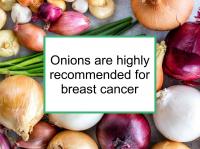Onions (Allium cepa), garlic and other members of the allium genus, such as leeks, chives, scallions and shallots, have been shown to have antimicrobial, radioprotective, antithrombotic, hypolipidaemic, anti-inflammatory, antiarthritic and hypoglycemic effects, as well as improving immune function.
Epidemiological studies have demonstrated an association between increased consumption of allium vegetables and a reduction in many different types of cancer, including cancer of the breast, prostate, lung, endometrium, stomach, colon, bladder, esophagus, larynx, mouth, ovary, and liver, as well as melanoma, acute myeloid leukemia, and childhood acute leukemia.
Breast cancer-related effects of eating onions
Numerous studies have shown that onions and their components inhibit proliferation, reduce migration and invasiveness, and induce apoptosis of human breast cancer cells. Onions contain various substances reported to have anti-breast cancer effects, including quercetin (especially red onions), fisetin and vitamin C.
One large European study found that eating onions and garlic was associated with lower risk of breast cancer. Another large Italian population-based study found a relationship between the consumption of increasing intake of flavones and flavonols found in allium vegetables and a reduction in the risk of breast cancer. A study of women in Mexico City found that consuming more than one slice of onion per day was associated with reduced risk of breast cancer. A Korean study found an association between onion and garlic consumption and lower incidence of breast cancer. However, there were no clear associations found between breast cancer risk and the consumption of onions or of individual flavonols in a study of premenopausal women in the Nurses Health Study II.
Quercetin has been reported to increase the effectiveness of doxorubicin, paclitaxel, and 5-fluorouracil (5-FU) chemotherapy in ER+/PR+ breast cancer cells. Quercetin has also been shown to inhibit aromatase, thereby supporting anti-estrogen treatment.
Both quercetin and fisetin have been shown to inhibit the migration of triple negative (ER-/PR-/HER2-) breast cancer cells, thus helping to prevent metastasis.
Chives are a good dietary source of the lignan enterolactone. Postmenopausal women with breast cancer and a high intake of enterolactone have been found to be less likely to die from their breast cancer than those with a low intake. Enterolactone has also been found to increase the sensitivity of breast cancer cells to radiation, thereby potentially enhancing the treatment effects of radiotherapy.
Chives also contain kaempferol. Green onions (scallions) and leeks are excellent sources of beta-carotene. Green onions also contain zeaxanthin, vitamin C, and vitamin K. Chives also contain vitamin C. Red onions are a source of delphinidin. Each of these micronutrients have chemopreventive properties with respect to breast cancer.
Sources of information provided in this webpage
The information above, which is updated continually as new research becomes available, has been developed based solely on the results of academic studies. Clicking on any of the underlined terms will take you to its tag or webpage, which contain more extensive information.
Below are links to 20 recent studies concerning onions vegetables. For a more complete list, please click on onions.
